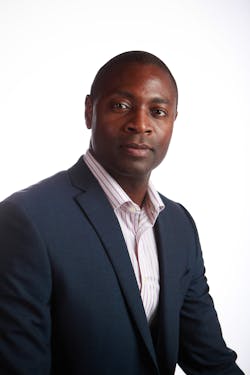2015 Top 40 Under 40: Darnell Chadwick Grisby, MPP
Darnell Chadwick Grisby, MPP
Director, Policy Development and Research
American Public Transportation Association (APTA)
- Alma Mater: University of California, Los Angeles and Harvard University
- Fun Fact: Grisby was the first openly gay person to run for student government and win at UCLA
- Favorite Book: "Invisible Man" by Ralph Ellison
- Favorite TV Show: "South Park"
- Favorite Movie: "The Matrix"
With a grandmother that took the bus every day, Darnell Chadwick Grisby had an interest in public transportation at a young age. He got involved in it and focused on developing skills to be more politically persuasive, which led to moving to Washington, D.C.
Grisby worked for Reconnecting America, working closely with Rutgers University. The American Public Transportation Association (APTA) was looking for someone to run its research division and he know it was the ideal opportunity for him to offer his expertise and learn from the agencies and business members APTA works with.
As APTA's director of policy development and research, Grisby’s duties require vision and a keen understanding of the nationwide trends and data sources. He was the primary author of noteworthy reports, including, "The New Real Estate Mantra: Location Near Public Transportation;" "Millennials and Mobility: Understanding the Millennial Mindset;" "Economic Impact of Public Transit Investment;" "A New Partnership: Rail Transit and Convention Growth;" "The Role of Transit in Support of High Growth Business Clusters;" "The Business Case for Public Transportation Investments;" among many others.
Grisby also manages APTA's extensive statistics efforts. He is able to help APTA’s government affairs and communications teams articulate the message using data.
Grisby is very active in the Urban Land Institute (ULI), and the Transportation Research Board (TRB). He will soon complete an intensive year-long leadership program at ULI, where he cultivated close relationships with key players in real estate community, particularly in regard to transit-oriented development.
“The biggest challenge is trying to break through some of the noise because there are so many groups in Washington working on their set of issues and the question is, how do you connect our data to people’s heart strings and make them understand the need for coming up with the funding solution that we need? That’s an additional hurdle to get through that noise because everyone has an agenda here. It’s about how you connect with the stakeholders.
“I like the fact that it’s quite essentially a non-partisan patriotic tool that we can use to improve our communities, that there’s not a Republican or Democrat bus line, it belongs to America. I like the fact that it really supports the bottom line of our largest corporations and that it provides access to opportunity for millions of people. It’s a great tool that one can feel really good about.
“I think I would love to see us become a model for how to reinvent American government. If we can utilize our expertise with teaming up with the private sector, better leverage technology and show value for money, I think other services that are usually associated with government will follow our example and it will be great to have it be a model for how to make American government more responsive to the American taxpayer.
“When I travel, I really find myself interested in the built environment and how politics impact the way those communities were developed. That gives me a sense of the DNA of the place and it all makes a lot more sense to me. I can see why things are the way they are there.”
